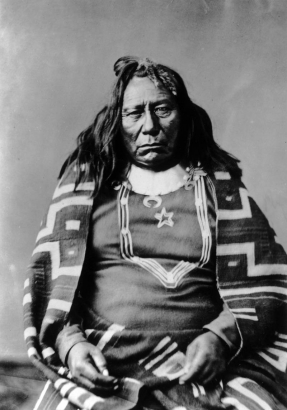(This article is part of an ongoing series on Collecting Western History for the 21st century in which we examine how the Western History and Genealogy Department is adapting its collection development plan to meet the needs of researchers.)
For much of the 20th century, scholars tended to view the American West through the lens of those of European ancestry. More often than not, these researchers offered a limited view of the people who inhabited this land before western expansion. While this certainly doesn't mean that the work of established western historians of that era should be discounted, it does open the door for a new generation of scholars like Peter Cozzens, author of The Earth is Weeping: The Epic Story of the Indian Wars for the American West (Alfred A. Knopf, 2016), and others to present more holistic views of this period.
Cozzens's book is part of a larger effort by researchers to be more inclusive and present Native Americans as dynamic human beings who were more than just victims of historical events. Throughout his book, Cozzens delves deep into inter-tribal politics and demolishes the inaccurate picture of how indigenous people interacted with each other that most of us have.
This trend is taken a step further in works like Mesa of Sorrows: A History of the Awat'ovi Massacre by James Brooks (W.W. Norton Company, 2016), that tell of events in which Europeans were not involved at all. For his research, Brooks relied heavily on archaeological records and oral traditions, as written accounts of these events do not exist. The idea that native peoples have a history that predated European contact, and that this history is valid and worthy of scholarship, is long overdue. So much has been taken from native peoples that can never be returned; it's important that their own historical perspective be known.
Moving forward to the 20th century, the western story becomes less about the conflict between settlers and indigenous peoples and more about the challenges of managing resources and growth in a region where water is scarce and resources like oil are abundant. It's a natural progression that moves from the era of settlement to the era of settled in. To that end, the department is always looking for new publications like The Man Who Thought He Owned Water: On the Brink with American Farms, Cities, and Food by Tershia D'Elgin (University of Colorado Press, 2016) and Coyote America: A Natural and Supernatural History by Dan Flores (Basic Books, 2016) that examine the natural history of the west.
Another emerging trend that will be reflected in the department's collecting habits, is the number of scholars who are telling the stories of non-European immigrants and visitors to the west. Whether they're Chinese railroad workers, Mexican Braceros who labored in American industries during World War II or African-American settlers in the Northwest, these are people whose stories have been overlooked or misrepresented for far too long.
The expanded notion of whose history is told when telling the story of the American West is a positive trend for everyone and does not have to diminish the work of previous generations of scholars. It's to everyone's benefit to present a more complete picture of the amazing, colorful, sometimes quite violent, and always interesting people who've populated what is now known as the American West.
Are there books about the American West that you think might belong in the Western History Collection? We'd love to hear your suggestions in the comments section below.


Add new comment